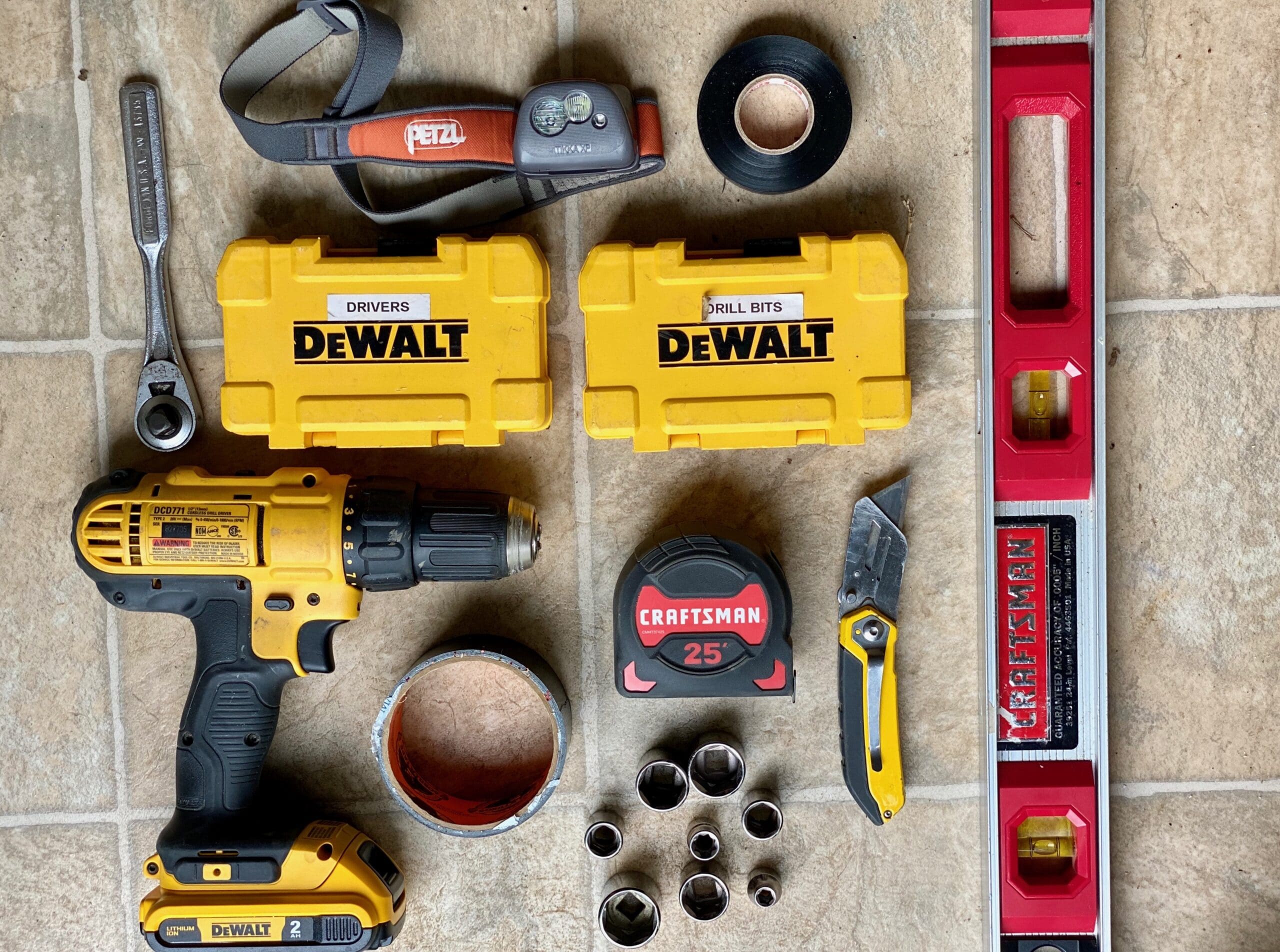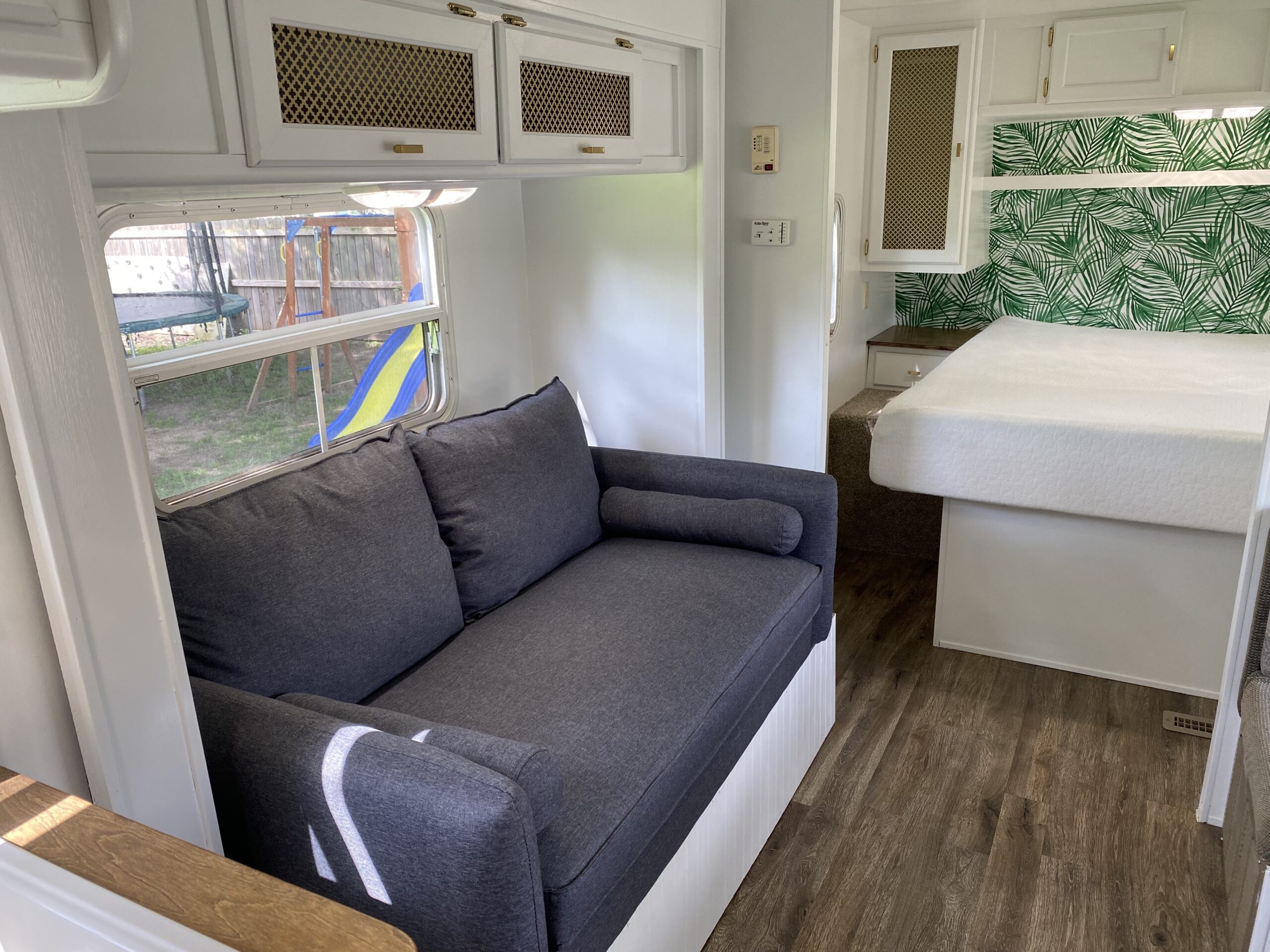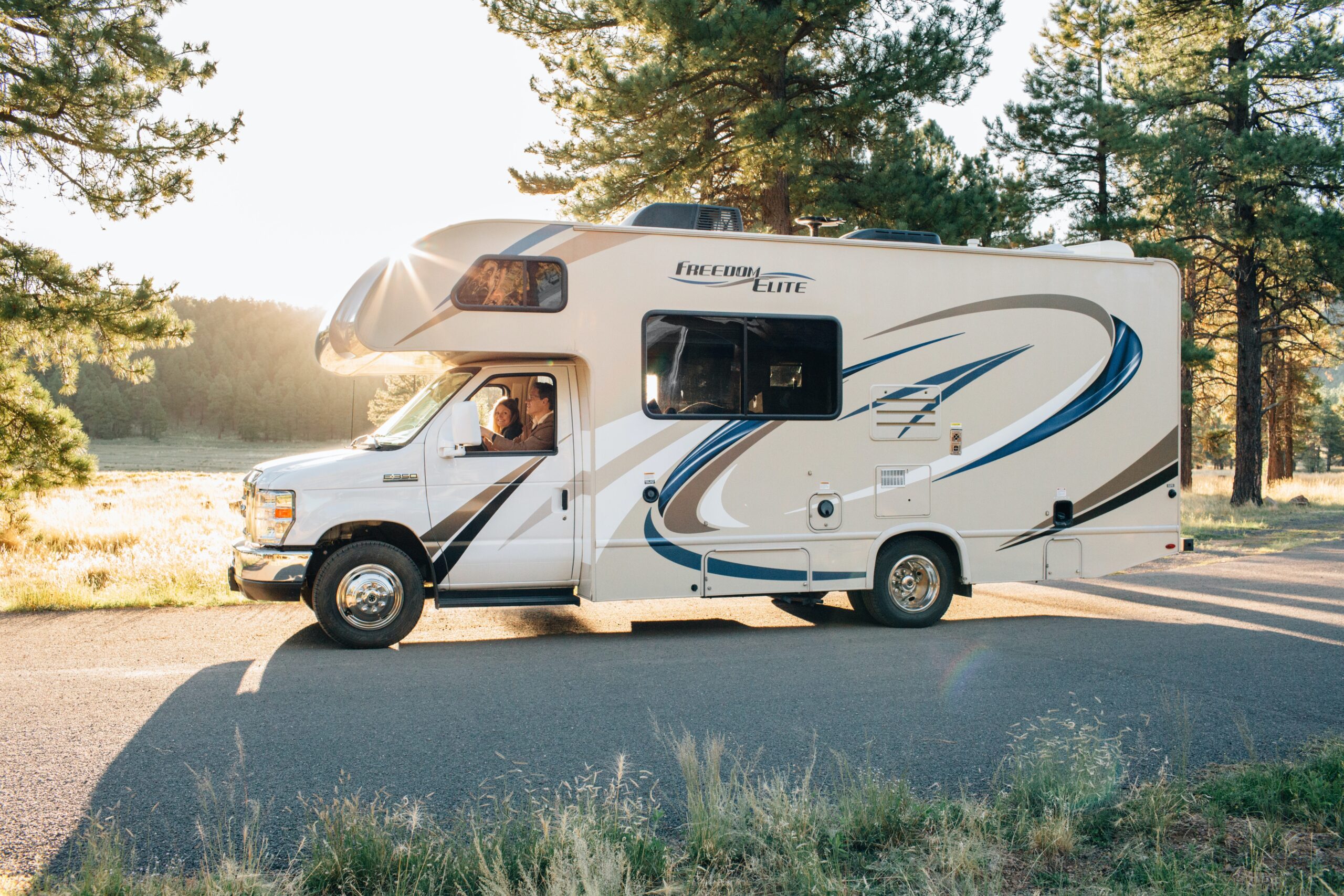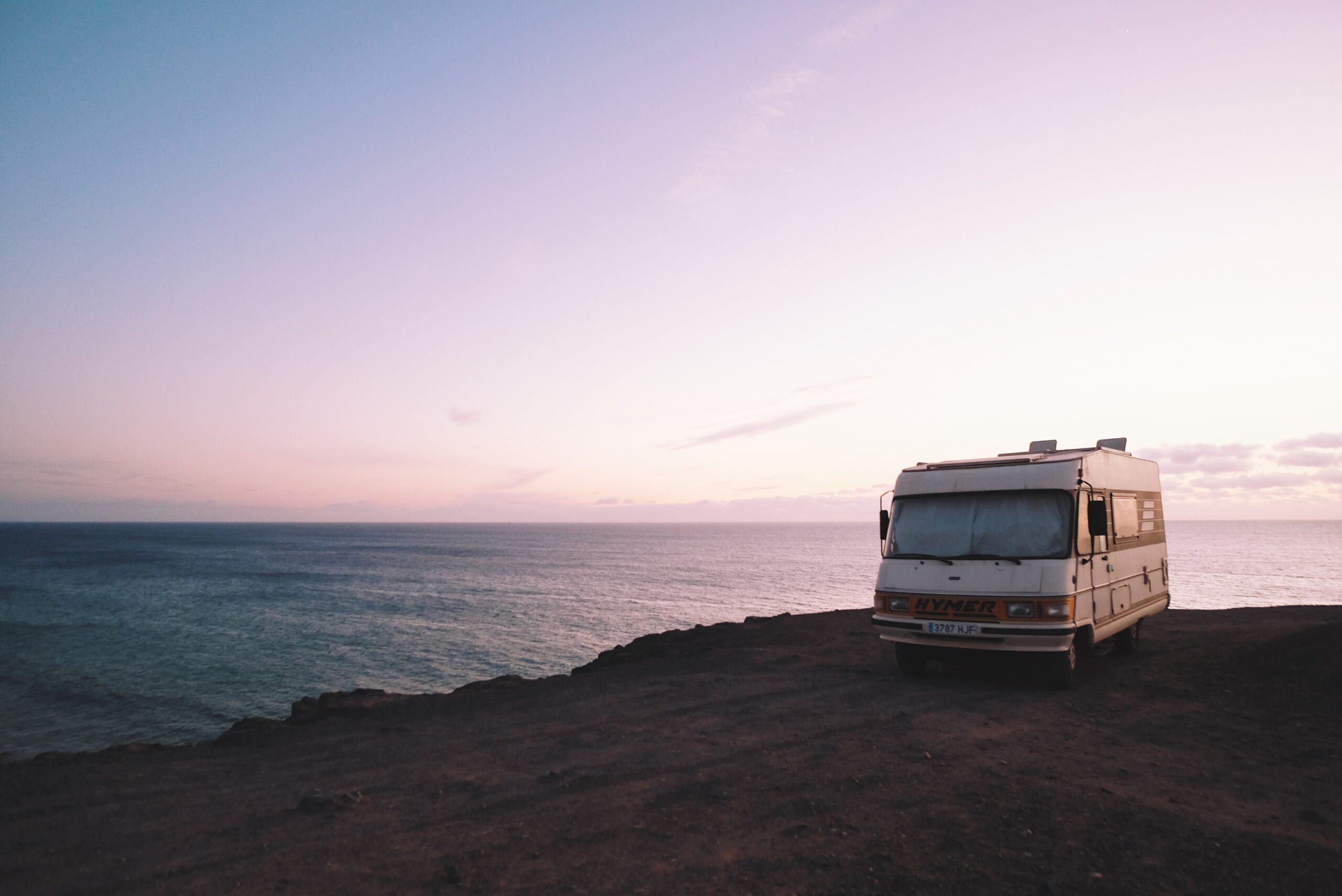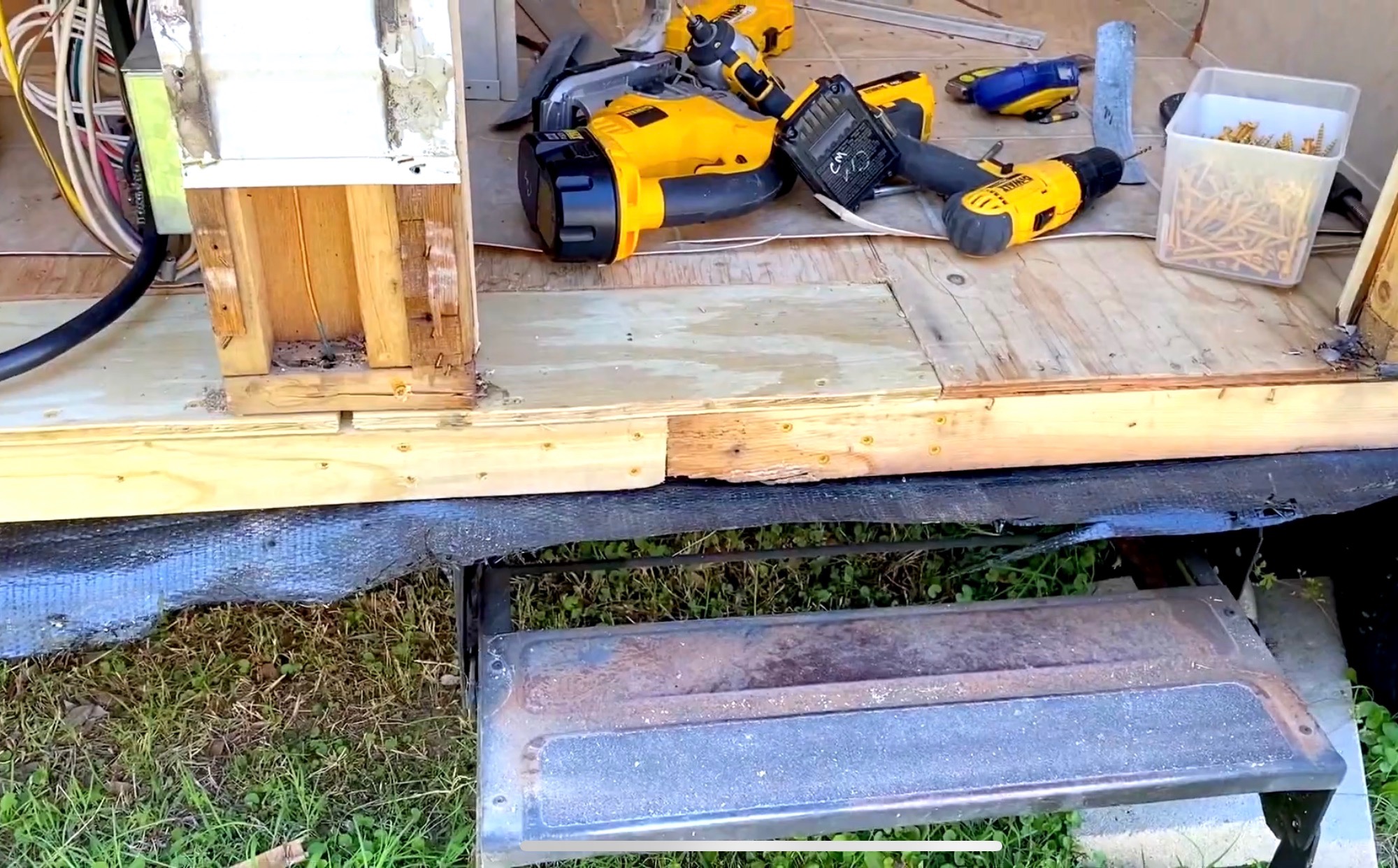It doesn’t matter if you are a full-time RVer or someone who goes out a couple of times a year, little things always seem to pop up that need to be fixed.
RV maintenance and upkeep something we can’t get away from. Think about it, we are placing a house on a trailer and towing it in all types of conditions.
Why do I need tools in my RV?

RVs always have issues
The amount of stress and exposure to the elements is staggering when you think about it. Not to mention, RVs can only be built so well and let’s face it, there are some manufacturers who cut corners anywhere they can. As a result, issues show up from time to time.
RV Maintenance
Also, there is routine maintenance you need to stay on top of. Taking care of regular maintenance issues can help minimize trouble down the road. Performing this routine work helps you become more familiar with your rig and may help you identify other issues before they rear their ugly heads. All of these are good things.
Save Money
This can be a big one for a lot of folks. For many, saving money while traveling is paramount. It allows us to go further and longer and reduces stress related to money issues.
Paying someone to fix mechanical problems or to perform maintenance is costly. Being equipped to do it yourself can save a lot. With the amount of reference material online, most people can perform the work that needs to be addressed by themselves. There’s no need to hire someone.
But, you have to have the tools and equipment to do this type of work. So, you can either carry it with you or purchase it as needed. Purchasing it as needed is not always convenient. Matter of fact, you may not be in a place where you can purchase what you need.
Planning ahead is critical.
What tools do I need for my RV?
So, if you are on the road and you want to be able to perform maintenance and fix issues as they occur, what tools do you need?
Hand tools

Below are the hand tools you should consider. A lot of these tools can perform multiple tasks, which is always a plus. Another benefit is they should all easily fit into a small soft-sided tool bag. These are easy to store, easy to carry and help to save space.
- Phillips screwdriver(s): Make sure you have the proper size or sizes for your rig. This may take a variety. It never hurts to have a size variety.
- Flathead screwdriver: Like the Phillips above, make sure you have a selection of sizes to suit your needs. Besides, what if your neighbor needs to borrow one?
- Squarehead screwdriver: RVs are notorious for using square recess fasteners. You definitely need squarehead screwdrivers to fit what you have.
- Crescent wrench: Some folks call these adjustable wrenches, but the use is the same. It’s an open-ended, adjustable wrench allowing you to use it on a variety of nut and bolt sizes.
- Wire strippers: If you are forced into making any electrical repairs on the road, wire strippers may come in handy. You could always do like me and try to use a pocket knife or utility blade, but their not the most effective and safe. Grab some wire strippers and save the hassle.
- Wire cutters: Diagonal cutters are another tool for electrical repair. Make sure you size them appropriately to handle the largest gauge wire you will be working with.
- Hammer: A good claw hammer is a necessity if you need to hammer, nail, pry, etc. You don’t need anything large like a hug framing hammer, just one adequate enough to do moderate work.
- Ratchet and socket set (standard and metric): When you are searching for a set, or if you are piecing it together, be sure to have both standard and metric. Between RV repair, tow vehicle repair, etc., you never know what you will need. Additionally, make sure you have a selection of extensions and other related accessories.
- Wrench set (standard and metric): Much like the set above, you need a good wrench set. A solid combination set can handle a lot of different tasks.
- Utility knife: A quality folding lock-back utility knife is a must. From cutting, to scoring, to trimming, and more, these are super handy. Be sure to carry extra blades as well.
- Level: Mainly used to assist in leveling your rig, having an easy to read carpenter’s bubble level is mandatory. Make sure it’s the right size for what you need.
- Caulk gun: Whether you’re applying silicone or construction adhesive, you will need a caulk gun to get it done.
- Vice grips: Locking pliers are one of those tools that’s invaluable when you need some extra grip or more torque to get the job done.
- Regular pliers: Great for all tasks, pliers are a quick and easy tool to use for gripping, twisting, turning, holding, and more.
- Channel-lock pliers: Channel locks can be used when you need a little more “oomph” than regular pliers provide. They are great for bending, crimping, holding, etc.
Power tools

Admittedly, power tools add weight to your rig. This is something we all need to be cognizant of. However, with proper planning, you should be able to carry an assortment of power tools with no problem.
In my opinion, the benefits of these tools far outweigh the weight or space issues. They allow you to save time. They make light work of otherwise difficult tasks. And, they can allow you to save precious money while on the road.
When we look at the tools below, we are not including an expansive list of items. We are merely listing a few basics to consider.
- Cordless drill: Cordless drills are a lifesaver for me. Drilling holes, working with screws, etc., are all much easier and much faster to do. Make sure you have an assortment of bits and drivers to suit your needs.
- Drill bit set
- Driver set
- Cordless impact: These have a lot of uses like lowering and raising the stabilizer jack and assisting in changing flats. However, be aware of how much noise they make and be considerate of your neighbors.
- 18-volt mini blower: Can be used to clear off wet leaves and debris from the top of slides, the roof, etc. Again, be cognizant of noise if you have neighbors.
Miscellaneous tools

Below are a few miscellaneous tools that don’t really fit in the two categories above. However, they get used all the time. Keep in mind, you may go many trips before needing one of these, but when you do, you do.
- Voltmeter: A voltmeter can come in really handy when testing batteries, troubleshooting electrical issues, testing fuses, and more. They’re small, effective, and worth the space they take up.
- Battery charger: No explanation is really needed here. A battery charger is another one of those items that seem to be in the way until you need it. Again, super handy for maintaining a charge on batteries.
- Ladder: A portable ladder can be super helpful in cleaning your RV, accessing the roof, or assisting with repairs or maintenance in hard to reach places.
- Flashlight: Everyone needs a good flashlight or two in their RV. Make sure you get one with enough lumens to get the job done. Also, if it uses the same batteries as your other battery-powered items, it makes it easy to stock what you need.
- Headlamp: Piggy-backing off of flashlight, you need a headlamp as well. Headlamps are useful when performing night time tasks and you need both hands free.
- Tape measure: You have to have a tape measure. You know…in case you need to measure stuff!
Supplies

Finally, let’s talk about some of the supplies and miscellaneous items that go hand-in-hand with your tools and the repairs and maintenance you will be performing.
- Assorted screws (sized for your camper): Things come loose, screws pop out, things need reinforcement, and more. Again, like most things, make sure they are the appropriate size for what you need.
- Assorted wire terminals (sized for your camper): Again, if you have to perform some electrical work, you will be glad you have these. Buy a kit with assorted options so you can handle a variety of tasks.
- Fuses: Fuses can be frustrating and a blessing at the same time. It can be a pain to diagnose bad fuses, but they are super easy to replace. However, in order to replace a fuse, you have to have a spare fuse. Fuses are mandatory and make sure you have all the styles and sizes you need.
- Replacement bulbs: Take an inventory of all the lightbulb styles and sizes in your camper. Carry a spare or two for each type. A burnout bulb won’t ruin your trip, but it can be a little frustrating. Also, make sure you have spares for brake/tail-lights as well.
- Hose washers: Throwing a few hose washers in your kit won’t really take up any extra space, but could be useful in preventing that freshwater connection from leaking. It sucks having a mud hole form by rig due to a leaking connection.
- Zip ties – Zip ties have a ton of uses and it’s really up to your imagination. Keep some on hand and be glad you did.
- Teflon tape: Plumber’s tape will assist you if you have any plumbing issues you have to address. Sometimes a leaky fitting can be addressed with a little Teflon tape and some tightening.
- Gorilla tape/Duct tape: These are another one of those must-have items. It can help fix tears, stop leaks, over sharp edges, hold things in place, etc.
- Eternabond tape: Eternabond tape make light work of roof leaks that spring up unexpectedly. While a little expensive, it can be worth its weight in gold if you need it.
- Electrical tape: Again, mandatory for a lot of electrical work and other things that need taping. It never hurts to have a couple of rolls in the tool bag.
- Silicone: Back to water leaks, windows, doors, seams, etc., develop leaks over time due to sealants that get old and weathered. Instead of toughing it out while taking on moisture, keep a tube of silicone on hand to fix, repair, or replace old or compromised sealant.
- Construction Adhesive: This adhesive is great when you need something with some additional “sticking” power. One tube is sufficient and stores well.
- Gloves: I prefer a quality pair of leather gloves due to abrasion resistance. However, it wouldn’t hurt to throw in a pair of Mechanix type gloves as well.
Conclusion
Okay, I think that about wraps up the tools I keep on hand. These things fluctuate over time and I’m constantly adding, removing, or replacing things due to necessity.
One thing is for sure, and that’s I will always have a tool kit on hand. I’ve been caught needing things on too many occasions. Having a robust selection of tools onboard adds peace of mind and also allows you to help out others in need.
As mentioned above, be cognizant of weight and plan ahead to make sure you can accommodate the tools you need. As you go through this list, there may be tools you don’t need. If so, simply omit them from your tool bag.
Build your tools up slowly over time if you need to, and focus on hand tools and necessary parts and accessories at first. You can always add in the more expensive power tools at a later date and as your budget allows.
Take care and have fun out there.

